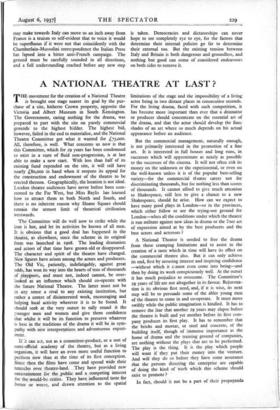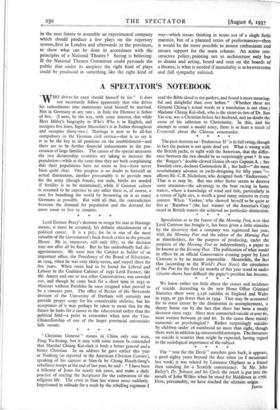A NATIONAL THEATRE AT LAST ?
THE movement for the creation of a National Theatre is brought one stage nearer its goal by the pur- chase of a site, hitherto Crown property, opposite the Victoria and Albert Museum in South Kensington. The Government, caring nothing for the drama, was prepared to part with the site on purely commercial grounds- to the highest bidder. The highest bid, however, failed in the end to materialise, and the National Theatre Committee got what it wanted for L.75,000. All, therefore, is well. What concerns us now is that this Committee, which for 29 years has been condemned to exist in a state of fluid non-progression, is at last able to make a new start. With less than half of its existing fund expended on the site, it will still have nearly £8o,00o in hand when it reopens its appeal for the construction and endowment of the theatre to be erected thereon. Geographically, the location is not ideal. London theatre audiences have never before been sum- moned to the Far West, but Miss Baylis has learned how to attract them to both North and South, and there is no inherent reason why Sloane Square should remain the utmost limit of theatrical civilisation westwards.
The Committee will do well now to strike while the iron is hot, and let its activities be known of all men. It is obvious that a good deal has happened in the theatre, as elsewhere, since the scheme in its original form was launched in 1908. The leading dramatists and actors of that time have grown old or disappeared. The character and spirit of the theatre have changed. New figures have arisen among the actors and producers. The Old Vic, patiently, indefatigably, against great odds, has won its way into the hearts of tens of thousands of playgoers, and must not, indeed cannot, be over- looked as an influence which should co-operate with the future National Theatre. The latter must not be in any sense a rival to any existing institution, but rather a centre of disinterested work, encouraging and helping local activity wherever it is to be found. It should seek at the very outset to rally round it the younger men and women and give them confidence that whilst it will be its function to preserve whatever is best in the traditions of the drama it will be in sym- pathy with new interpretations and adventurous experi- ment.
If :t can act, not as a committee-product, or a sort of semi-official academy of the theatre, but as a living organism, it will have an even more useful function to perform now than at the time of its first conception. Since then the films have come and spread wide their tentacles over theatre-land. They have provided new entertainment for the public and a competing interest for the would-be critics. They have influenced taste for better or worse, and drawn attention to the spatial limitations of the stage and the impossibility of a living actor being in two distant places in consecutive seconds. For the living drama, faced with such competition, it has become more important than ever that a dramatist or producer should concentrate on the essential art of the drama, and that the actor should develop the finer shades of an art where so much depends on his actual appearance before an audience.
But the commercial management, naturally enough, is not primarily interested in the promotion of a fine art. It is interested in full houses and long runs, in successes which will approximate as nearly as possible to the successes of the cinema. It will not often risk its money on the unknown or the experimental, or even on the well-known unless it is of the popular best-selling variety—for the commercial theatre caters not for discriminating thousands, but for nothing less than scores of thousands. It cannot afford to give much attention to Shakespeare, still less to give a chance to a new Shakespeare, should he arise. How can we expect to have many good plays in London—or in the provinces, which either follow or are the trying-out ground for London—when all the conditions under which the theatre is run militate against new ideas in drama or the 'i'ner art of expression aimed at by the best producers and the best actors and actresses ?
A National Theatre is needed to free the drama from these cramping limitations and to assist in the creation of a taste which in time will have its effect on the commercial theatre also. But it can only achieve its end, first by arousing interest and inspiring confidence —without which it c mnot even come into being—and then by doing its work conspicuously well. At the outset it has much prejudice to overcome. The Committee's 29 years of life are not altogether in its favour. Rejuvena- tion is its obvious first need, and, if it is wise, its next step will be to persuade some of the abler young men of the theatre to come in and co-operate. It must move swiftly while the public imagination is kindled. It has to remove the fear that another 29 years may elapse before the theatre is built and yet another before its first com- pany produces its first play. It has to remember that the bricks and mortar, or steel and concrete, of the building itself, though of immense importance as the home of drama and the training ground of companies, are nothing without the plays that are to be performed. The play is the thing. It is the play which people will want if they put their money into the venture. And will they do so before they have some assurance that the persons directing the enterprise are capable of doing the kind of work which this scheme should exist to promote ?
In fact, should it not be a part of their propaganda in the near future to assemble an experimental company which should produce a few plays on the repertory system, first in London and afterwards in the provinces, to show what can be done in accordance with the principles of a National Theatre ? Seeing is believing. If the National Theatre Committee could persuade the public that under its auspices the right kind of plays could be produced in something like the right kind of way—which means thinking in terms not of a single futile matinee, but of a. planned series of performances—then it would be far more possible to arouse enthusiasm and ensure support for the main scheme. An active con- structive policy, pointing not to architecture only but to drama and acting, heard and seen on the boards of a theatre, is what is needed if incredulity is to be overcome and full sympathy enlisted,







































 Previous page
Previous page